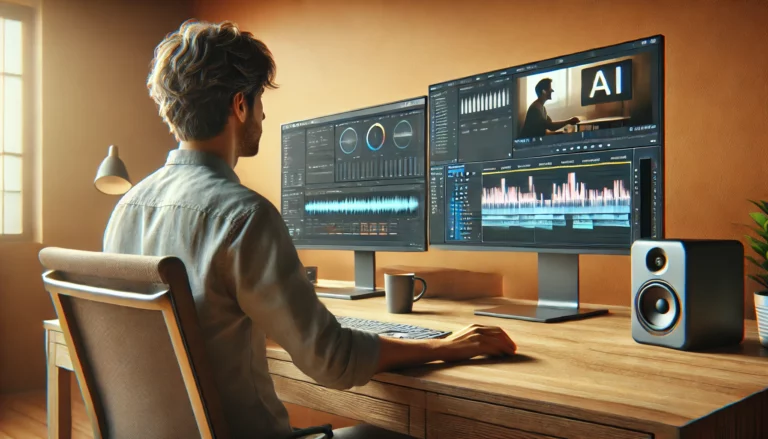Mazel tov! Your ridiculously procrastinated ambition to write a book has finally come to fruition. After late nights of swerving past writer’s-block cliches, you’re finally ready for an audience. Now it’s time to talk publishing. After consideration, you decide that lugging around the remains of a dead tree is simply outmoded in 2021. Enter audiobooks. They transformed the publishing landscape by bringing stories to life through the well-selected sound of a voice over actor. If you’re an author considering the prospect of broadening your audience base with audiobook production, we’re here to answer your FAQs.
This post has been updated in September 2021.
What is Audiobook Production?
Audio production is the process of recording transforming a written manuscript of a book into a narrated audio format. Audiobooks are gaining popularity in recent years because of their ease of consumption. Because listening is a passive activity in comparison to visual reading, it usually requires less eye strain and mental investment. More individuals opt to buy audiobooks even with the decrease in commutes as it allows them to pick up knowledge while multitasking. As such, an increasing number of heavy-hitter writers are investing in audiobook production to reach a whole new audience.
Why Should I Publish my Book in Audio Format?
The most compelling reason why authors are turning to audiobook production is its extensive reach. Updated statistics reveal that more than 131 million people have listened to an audiobook in 2021. To add to that, audiobook revenues saw an increase of 17% from 2019, contributing to a $1.3million revenue in 2021. These uptrend numbers are predicted to rise, therefore audiobooks are a worthy investment.
What does Audiobook Production Entail?
Hiring audiobook production companies may be a forty-winks solution to getting your book out in the market. That said, seasoned authors may feel uneasy with completely handing their content over to someone else. For that reason, understanding the process of audio production can give you more control over the outcome. Here’s a brief overview of the game players in the audiobook production workflow and some tips to get you started.
The Audiobook Author
The author is the writer of the content and the main director of the audiobook’s vision. He or she holds the vision to the outcome and dictates the direction, audiobook voice representation, and personality portrayal of the content.
Tip: Before initiating audiobook production, you should have a finalized book manuscript ready. Tweak that written piece to make it audio-friendly by removing parts of the content that would not make sense if narrated. These include visuals, captions, lengthy hyperlinks, and call-to-action prompts.
The Audiobook Distributor
Audiobook distributors are companies that publish audiobooks and make them visible to the audience. Without an audiobook distributor, the author’s audiobook would be hiding under a bushel, and the production investment would go to waste. Some of the popular distributors include Audible, Amazon Kindle, and iTunes housed under ACX (Audiobook Creation Exchange).
Tip: While some distributors also provide production services, converting a book into an audiobook by finding your own voice over and producer can be a fraction of that cost. Indie self-publishers who want more control over the price of their audiobooks can consider Author’s Republic and Publish Drive.
The Audiobook Voice Talent
Audiobook voice over actors are the narrators who bring the content to life through recording audiobooks in a professional studio. In actuality, the ability of a voice actor go beyond being able to read well. Other favored traits of an experienced voice actor include distinguishing characters in a book using varying vocal attributes, having clear enunciation, and working well with a mic to avoid vocal clicks and pops.
Tip: Although hiring an audiobook voice freelancer is more affordable than audible voice actors, sifting through quality auditions tends to be a frustrating hit-or-miss. A guaranteed way to hire an experienced audiobook creator to do so through platforms that already vet their talents, have a quality control system for projects and own a track record of client reviews. This enables you to focus your bandwidth on finding the right voice attributes that speak to your audience rather than have to worry about the quality outcome.
The Proof-Listener
Just like an editor for print publishing, a proof-listener listens and notes down any misreads or mispronunciations made by the voice actor. This might be a time-consuming process, but the reputability and viability of an audiobook usually hinge on a perfect narration.
Tip: Proof-listening might fall to the author, who has the best idea on how the book should be portrayed, or in some cases, the sound producer and who has a keen ear for picking up flaws. The narrator then rerecords these items, known as pick-ups, and sends them to the editor.
The Audio Editor
An audio editor has the technical skills and professional sound engineering equipment to remove noise, balance the audio, inserts sound effects, and weave in pick-ups sent by the audiobook voice over narrator. A good sound editor masters the corrected audio to produce audio consistency throughout the entire book’s audio. The project is exported to sound formats in the required specifications.
Tip: If you’ve decided to record the audiobook yourself but lack the skills to polish the audio quality, hiring professional post-production services can be an affordable and handy solution.

What is the Cost of Audiobook Production?
Cost is a massive consideration, especially for greenhorn authors, and the numbers vary massively in the audio production industry. Deciding on whether you’re recording audiobooks yourself, producing full-stack with ACX, or hiring external ACX services impacts the overall cost. But in general, the rate depends on the length of your book.
Audiobook Production by ACX
Should you be looking into hiring an ACX voice actor, the SAG-AFTRA union dictates that the rate cannot fall below $250 per hour. That adds up to approximately a minimum of $2,660 based on the average 100,000-word count for a book. By Audible narration standards, a 100,000-word book spans approximately 10.7 hours of narration time.
Audiobook Creation by Bunny Studio
Suppose you’re looking for a little more flexibility and control over cost. In that case, Bunny Studio houses a massive database of over 28,000 pre-vetted professional voice actors in over 50 languages and at varying rates. The platform filters skills set by gender, accent, age, and numerous other vocal attributes so you can find the perfect fit. The rates include a 100% satisfaction guarantee, revisions where needed, and quality checks in deliverables. Plus, turnaround times are quick, you own full rights to the audiobook, and you can also opt for post-production services if you need to go all the way.
How Long Does the Full Audiobook Production Take?
Timing matters. That’s especially when you’re marketing your book and talking about launch campaigns and digital engagement. While you can shorten the turnaround time with accuracy and skills, proof-listening still takes a solid chunk of time. At minimal, that’s your entire audiobook’s duration.
Then we add the tediously administrative task of prepping, uploading, and sending huge files and some allowance for mishaps, communication, and audiobook voice pick-up submissions. Give or take, that duration is about 4-fold the duration of your actual audiobook. This excludes 30 to 40 hours of audio post-production time for a 100,000-word book on top of that. The add-up is approximately 75 to 80 hours of work in total. Using these 100,000-word numbers as a gauge, we recommend planning ahead with the help of a productivity Gantt chart so that you know your audiobook production project is on track!
Can I Record the Audiobook Myself?
Of course, you can! Nothing is impossible; it just takes effort and quite a bit of patience. Not to mention, time. And that includes some vocal-cords-unwinding periods. That is not to say that there are no ups to independent audiobook creation.
Pros of Recording Audiobook Yourself
- You are the best producer for your desired outcome: As the author, you understand how you want to portray characters in the book the best. Here’s a guide on good narration practices.
- You have more control over cost and your earnings: It costs approximately $200, give or take, to acquire all the equipment and software you need for a small, make-shift studio.
- You choose which parts you want to outsource: Choosing to hire after attempting audiobook creation means you have a greater understanding of the production process and requirements you’re sourcing.
Cons of Recording Audiobook Yourself
- You fall short in vocal attributes: While you can train your vocal cords to differentiate a range of characters, every person has limits on his or her vocal range.
- You can’t deliver a certain accent: Though, not impossible, it takes a significant amount of time to naturally master an accent that you’re not native to.
- Coming off awkward in voice acting: After all, many voice actors began their career with on-stage acting. They have years of experience and know-how to compel the audience with the use of emphasis, pitch, and expression.
- You may struggle technically: Professional sound engineers and voice actors specialize in what they do for a reason. It’s possible to pick up the same skills, but it might take a little bit of meandering and research to produce a professional outcome.
- You lack experience in balancing the audio: Sound engineers are audiophiles with a keen ear for noise, aberrations, and other flaws. Producing an audiobook with a professional team enables you to represent the contents of your book in the best light. The road to hell is paved with good intentions, and an unprofessional-sounding audiobook can be off-putting to an audience no matter the content.
Additional Audiobook Publishing Tips?
We have plenty more up our sleeves, but here are a few to get the ball rolling.
Be Specific When Hiring an Audiobook Voice
When you were writing your book, you must have had an inner voice in your head; use that! Most first-time audiobook authors get into the market without knowing what they want. Consequently, this results in hours-on-end of voice artist auditions and often ends up with shabby inconsistencies. So, be as specific as you can. Dive into the nitty-gritty description of regional accents, emotion, style, age, and pitch. On top of that, creating an audio dictionary with the pronunciations of names, especially that of fictional ones, can help really help your narrator achieve accuracy. Short on words? Here’s an inspirational guide on how to describe a voice.
Get a Writer On Board to Help Make Your Book Audio-Friendly
An audio-friendly script is important in helping voice actors focus on what they do best, voice acting. Audiobook production can be an overwhelming process, especially when you’re juggling it all on your own. Sometimes getting a bit of help can go a long way, so hire when you tire!
Know Your Intended Audience
If you’re already at the stage of looking to publish an audiobook, you’d know by now who your target audience is. It’s important to frame your audiobook with an appropriate voice so you can reach your intended audience. Producing a factual textbook on political rights or business strategy? Consider hiring a middle-aged voice with resonant, reliable, and authoritative vocal qualities.
Earn Your Investment Back Through Strategic Distribution
While the quality and content of your audiobook are its main selling factors, it doesn’t hurt to increase your visibility. Some distributors, such as Publish Drive let authors tap into promotional mechanisms such as ads and discounts. Meanwhile, ACX distribution gives you the option of receiving higher royalty rates with exclusivity. There’s more than one way to skin a cat. You can also consider handing out a promotional code to everyone working on your production team to share with their circle of contacts in exchange for a review.
Enter, The Audiobook Bestseller
Going digital is always new to a writer somewhere in the world. Many authors have tons of self-doubt when it comes to calling the shots on audiobook production. Then there are costings, royalties, distribution channels to consider. Plus, that amazing voice artist might steal some of your market-entry thunder. Despite all that, we say going audio is the next big thing and a worthy investment. It’s high time you hopped on board that bandwagon!









